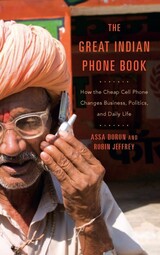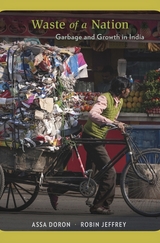
In 2001, India had 4 million cell phone subscribers. Ten years later, that number had exploded to more than 750 million. Over just a decade, the mobile phone was transformed from a rare and unwieldy instrument to a palm-sized, affordable staple, taken for granted by poor fishermen in Kerala and affluent entrepreneurs in Mumbai alike. The Great Indian Phone Book investigates the social revolution ignited by what may be the most significant communications device in history, one which has disrupted more people and relationships than the printing press, wristwatch, automobile, or railways, though it has qualities of all four.
In this fast-paced study, Assa Doron and Robin Jeffrey explore the whole ecosystem of the cheap mobile phone. Blending journalistic immediacy with years of field-research experience in India, they portray the capitalists and bureaucrats who control the cellular infrastructure and wrestle over bandwidth rights, the marketers and technicians who bring mobile phones to the masses, and the often poor, village-bound users who adapt these addictive and sometimes troublesome devices to their daily lives. Examining the challenges cell phones pose to a hierarchy-bound country, the authors argue that in India, where caste and gender restrictions have defined power for generations, the disruptive potential of mobile phones is even greater than elsewhere.
The Great Indian Phone Book is a rigorously researched, multidimensional tale of what can happen when a powerful and readily available technology is placed in the hands of a large, still predominantly poor population.

In India, you can still find the kabaadiwala, the rag-and-bone man. He wanders from house to house buying old newspapers, broken utensils, plastic bottles—anything for which he can get a little cash. This custom persists and recreates itself alongside the new economies and ecologies of consumer capitalism. Waste of a Nation offers an anthropological and historical account of India’s complex relationship with garbage.
Countries around the world struggle to achieve sustainable futures. Assa Doron and Robin Jeffrey argue that in India the removal of waste and efforts to reuse it also lay waste to the lives of human beings. At the bottom of the pyramid, people who work with waste are injured and stigmatized as they deal with sewage, toxic chemicals, and rotting garbage.
Terrifying events, such as atmospheric pollution and childhood stunting, that touch even the wealthy and powerful may lead to substantial changes in practices and attitudes toward sanitation. And innovative technology along with more effective local government may bring about limited improvements. But if a clean new India is to emerge as a model for other parts of the world, a “binding morality” that reaches beyond the current environmental crisis will be required. Empathy for marginalized underclasses—Dalits, poor Muslims, landless migrants—who live, almost invisibly, amid waste produced predominantly for the comfort of the better-off will be the critical element in India’s relationship with waste. Solutions will arise at the intersection of the traditional and the cutting edge, policy and practice, science and spirituality.
READERS
Browse our collection.
PUBLISHERS
See BiblioVault's publisher services.
STUDENT SERVICES
Files for college accessibility offices.
UChicago Accessibility Resources
home | accessibility | search | about | contact us
BiblioVault ® 2001 - 2024
The University of Chicago Press









